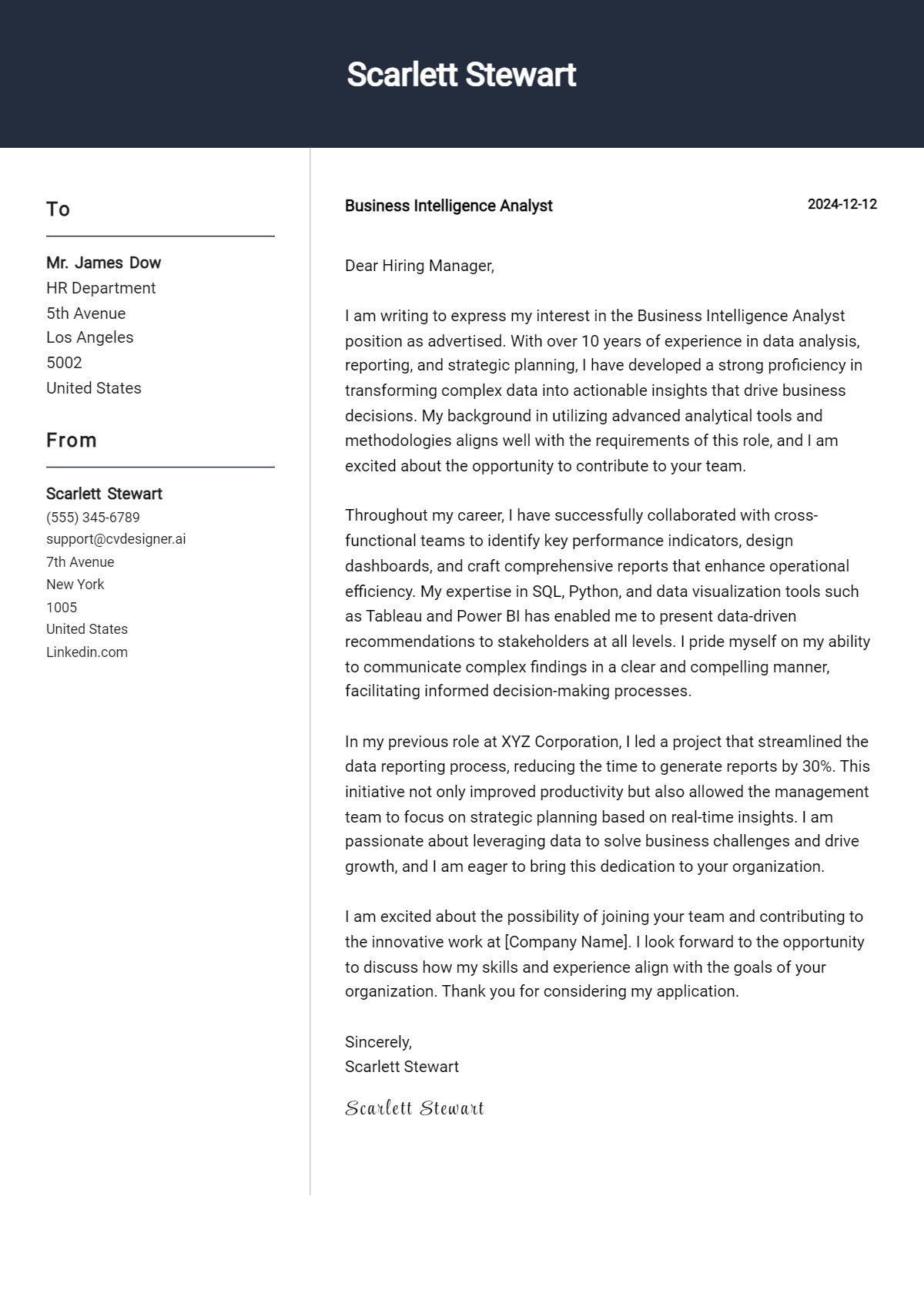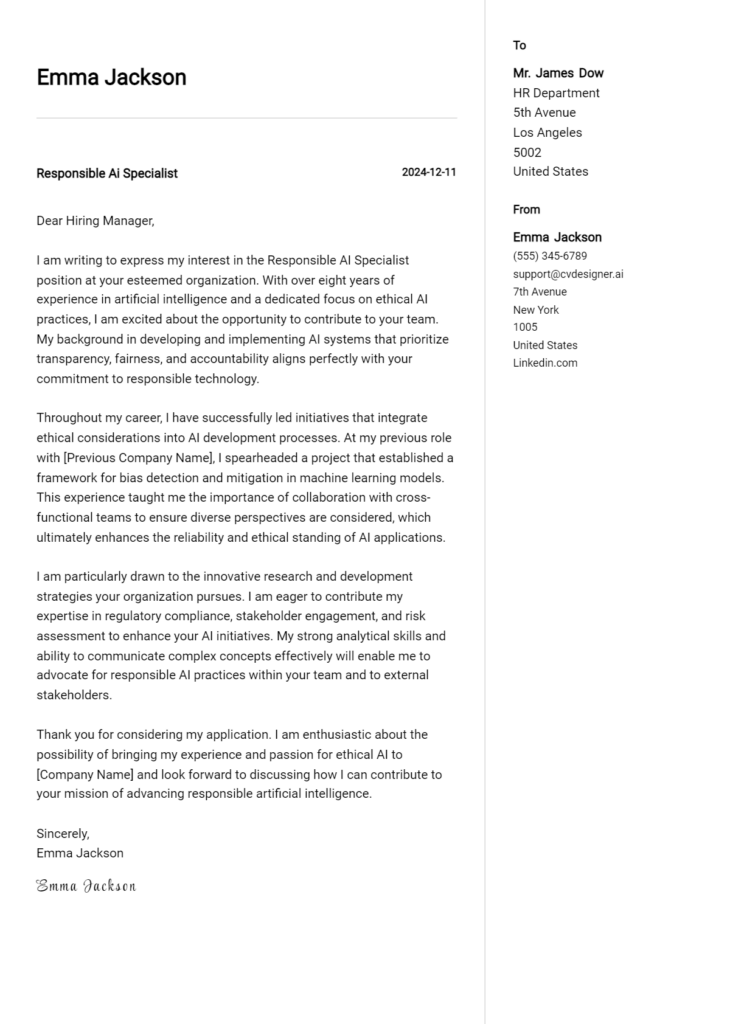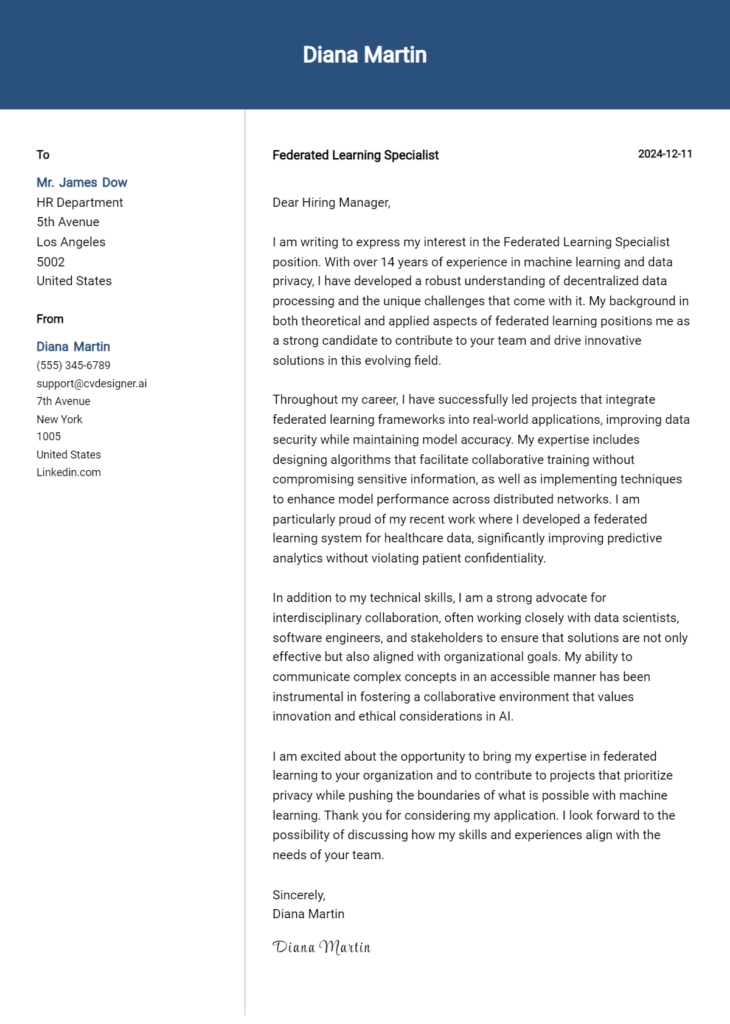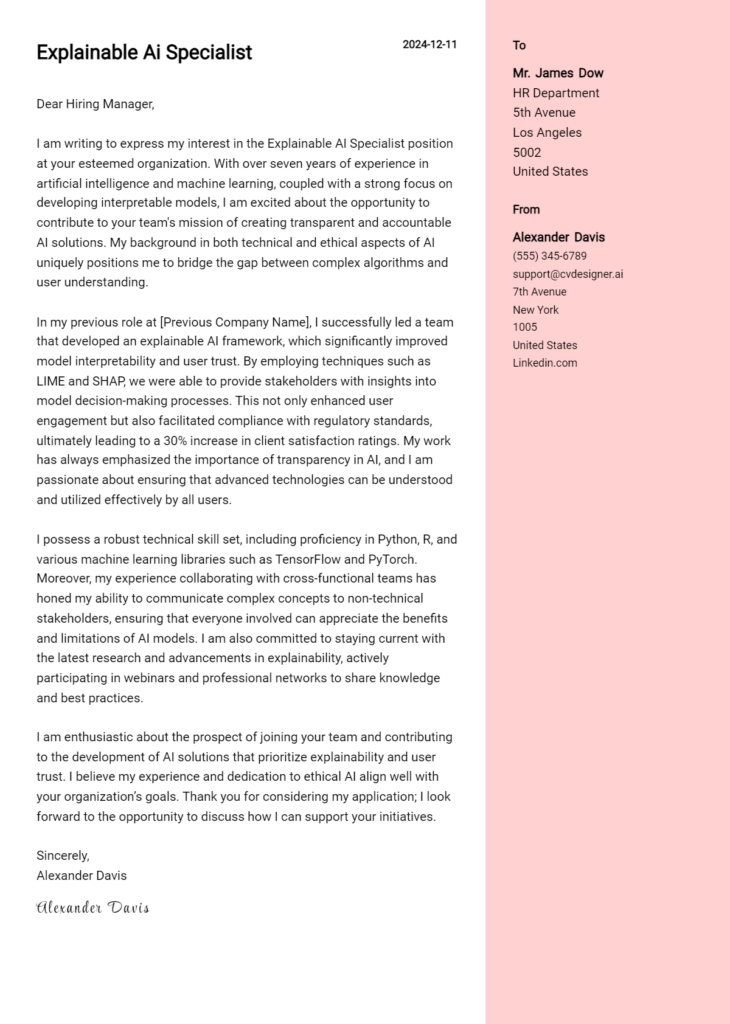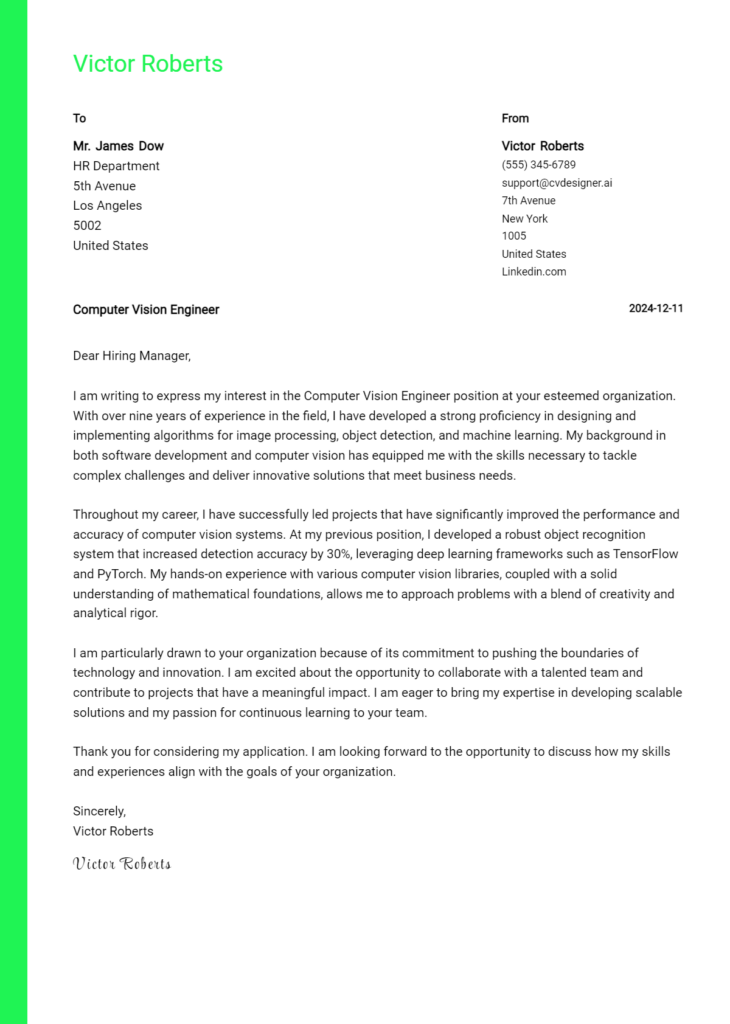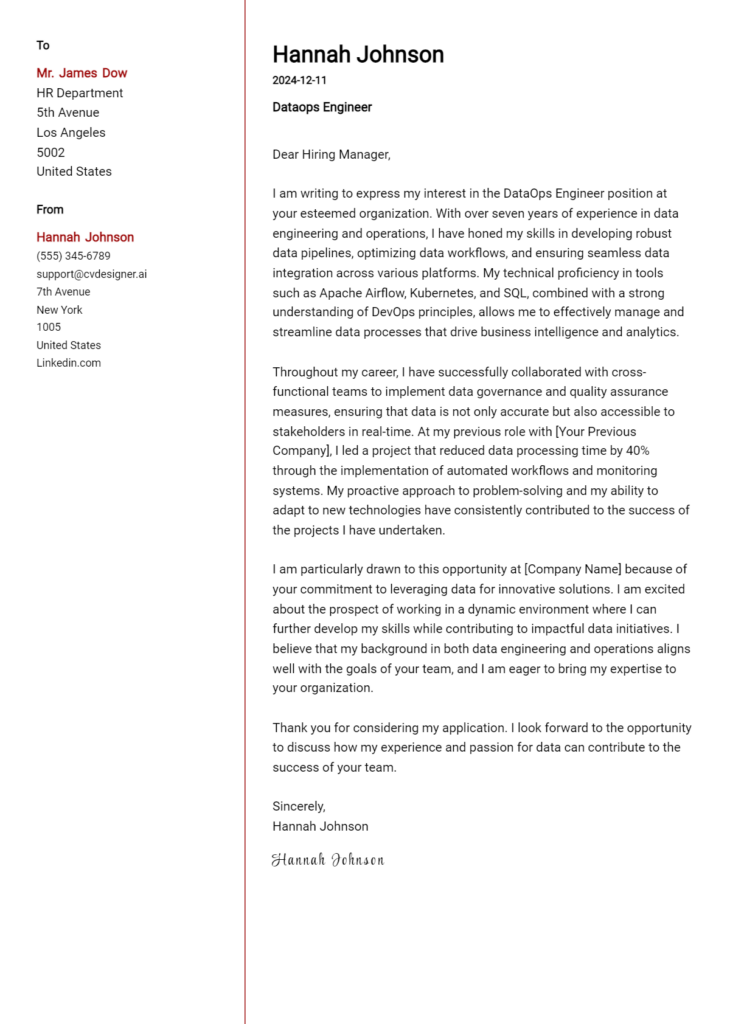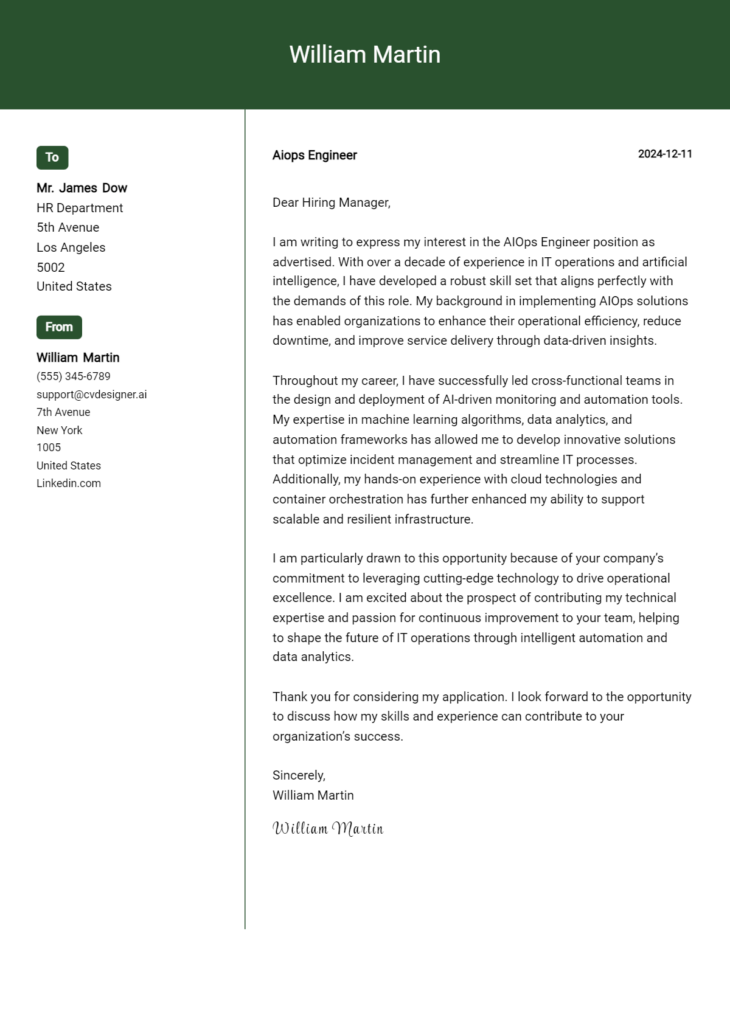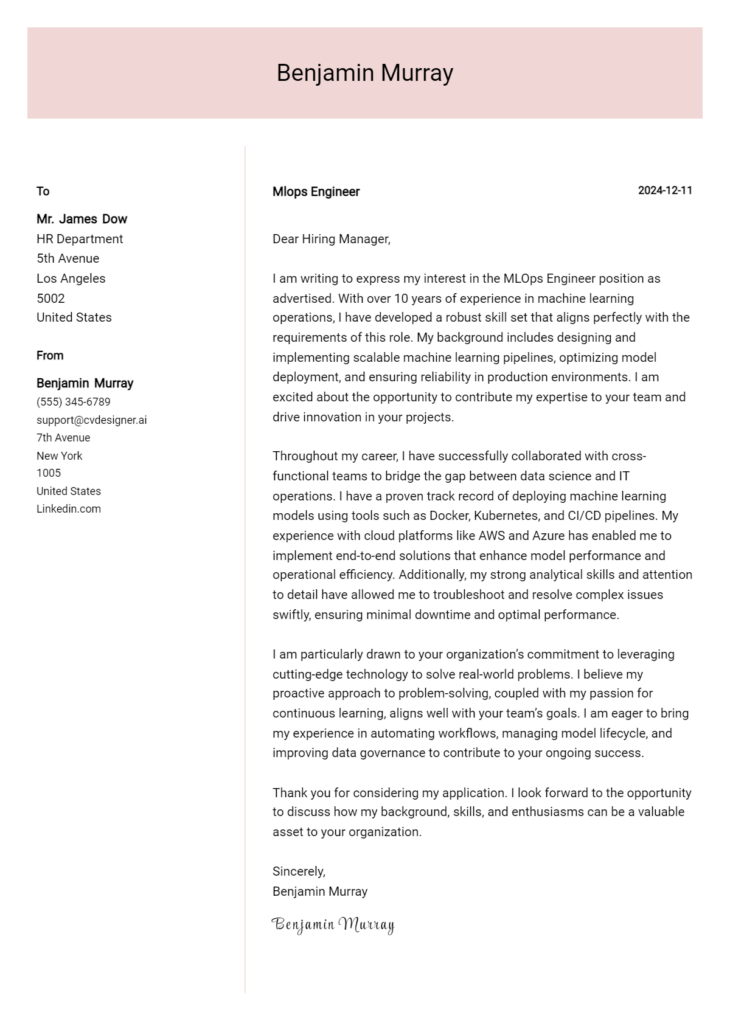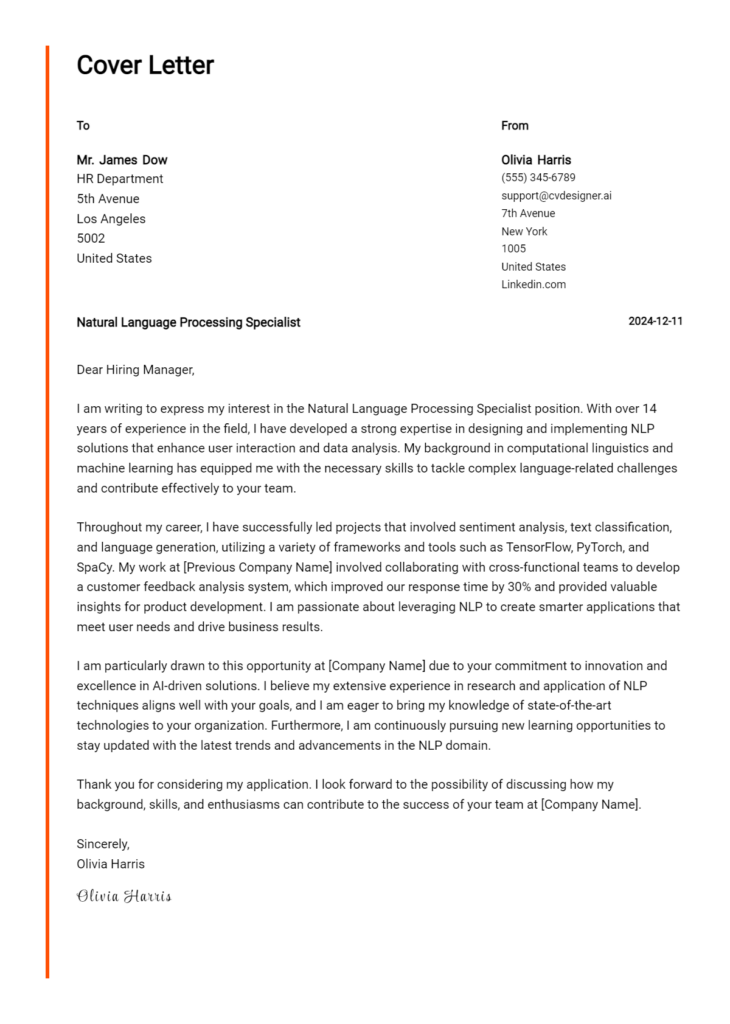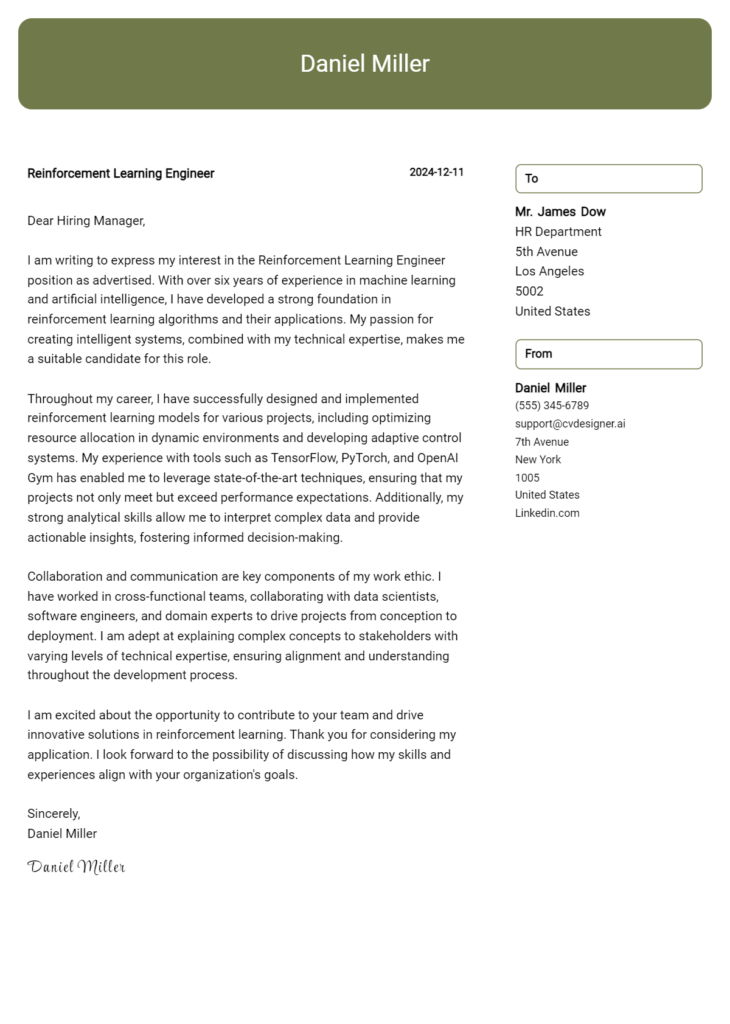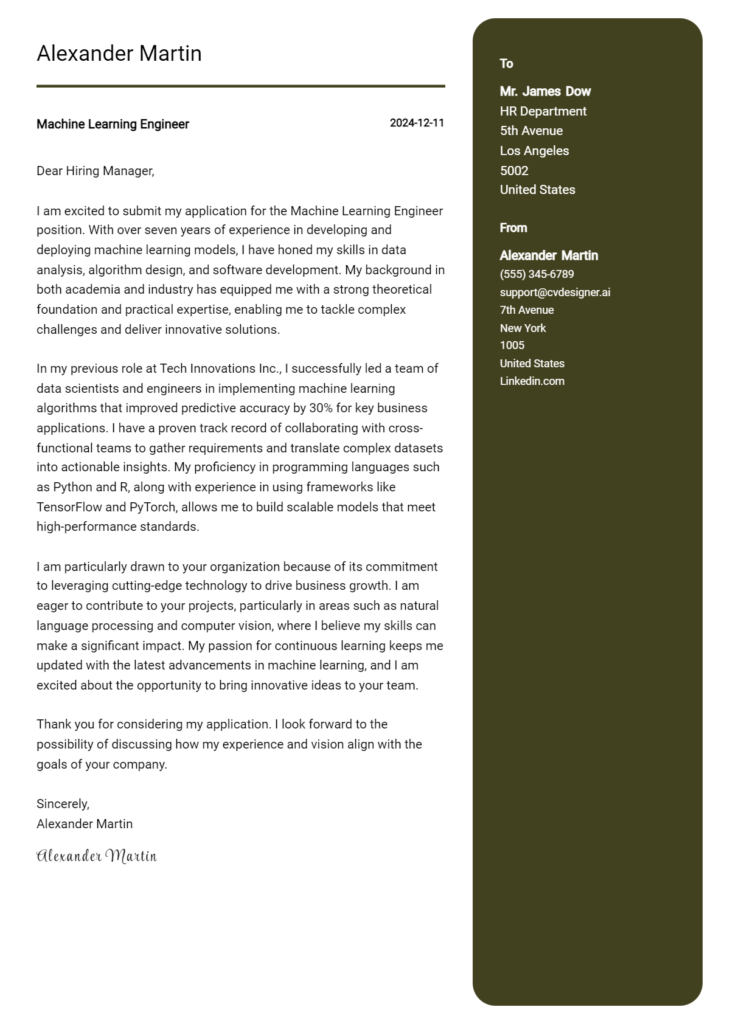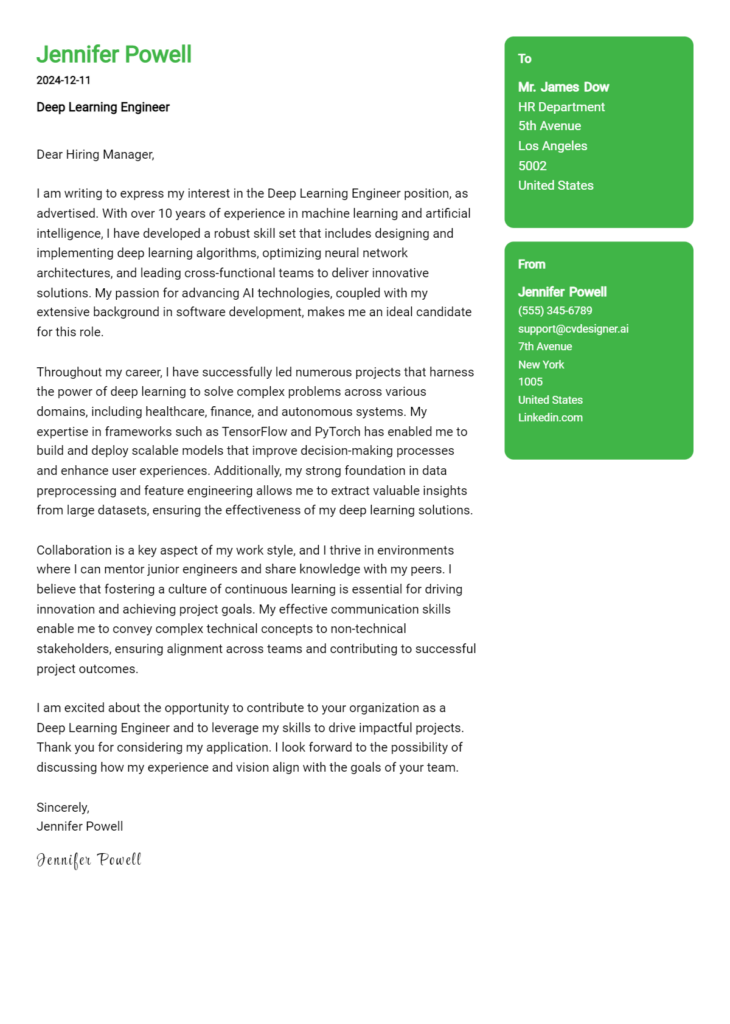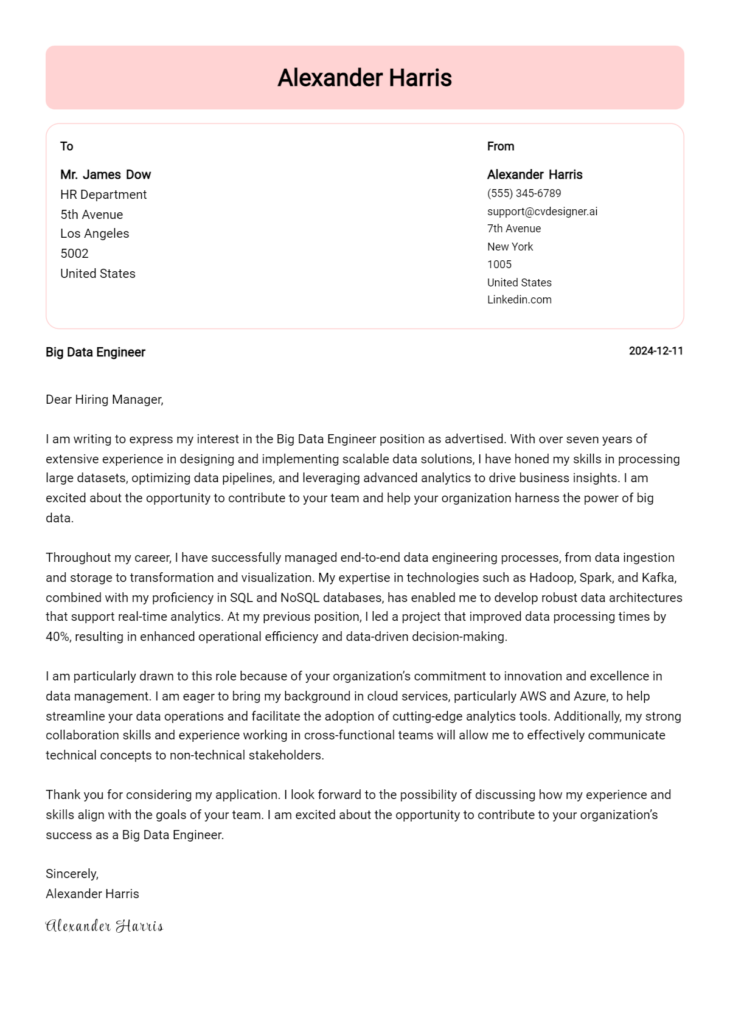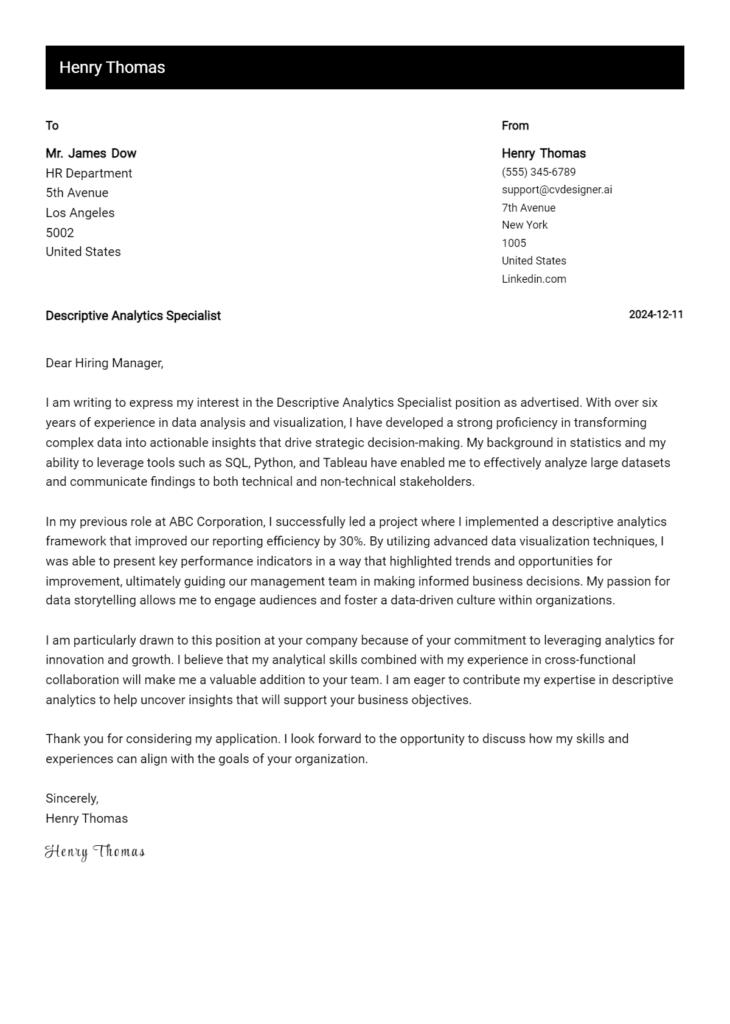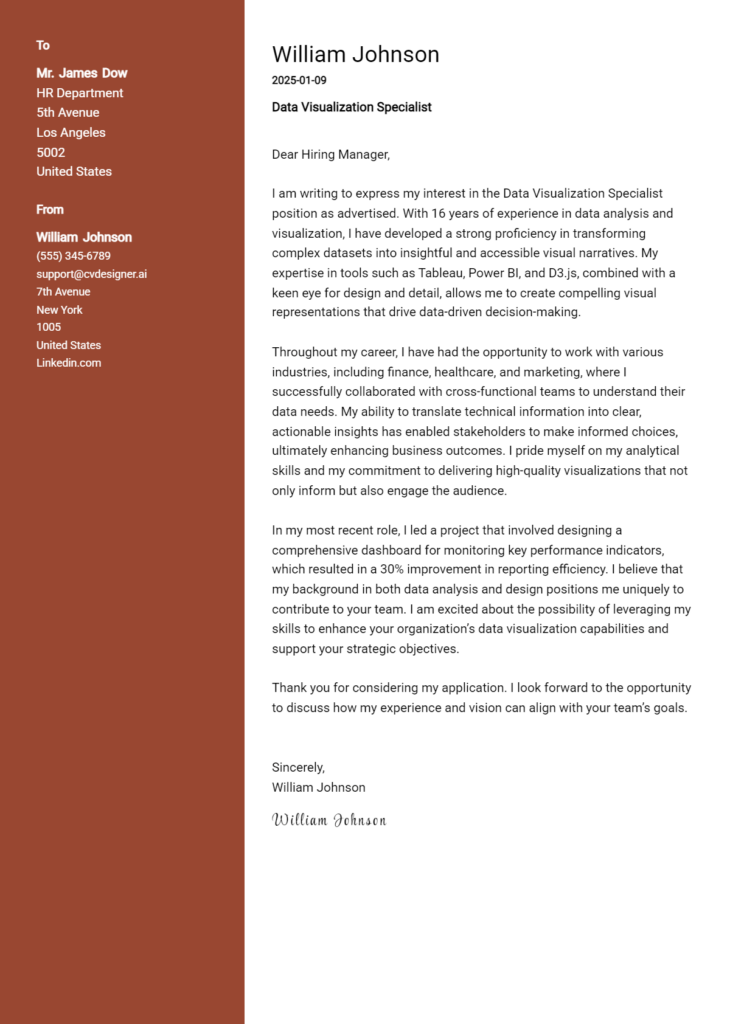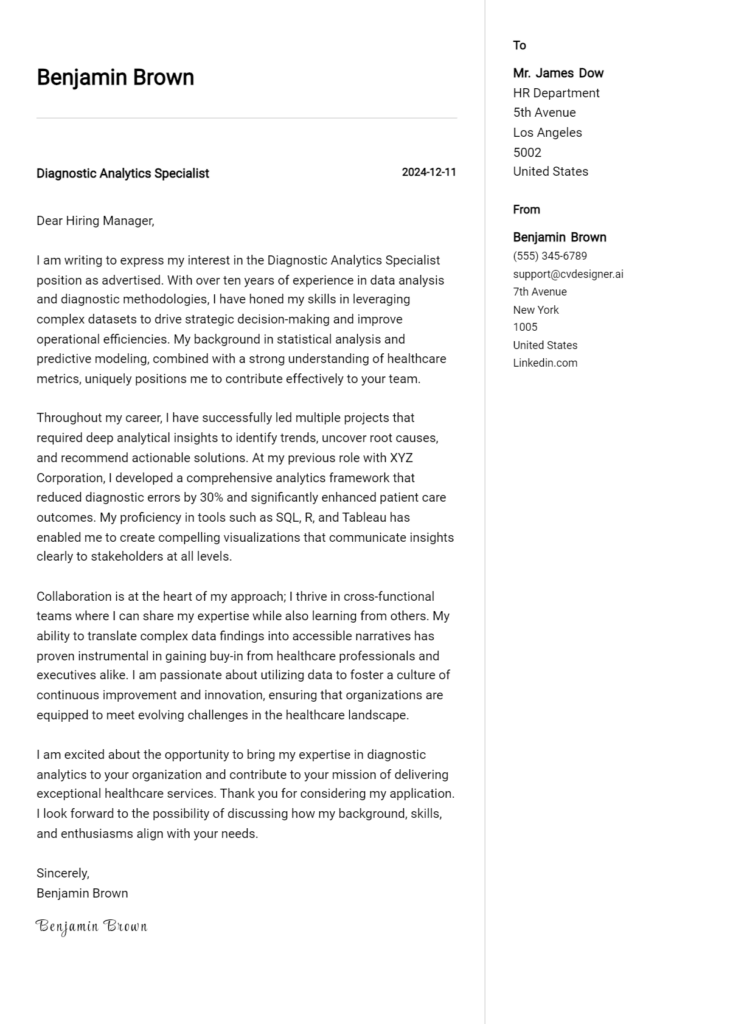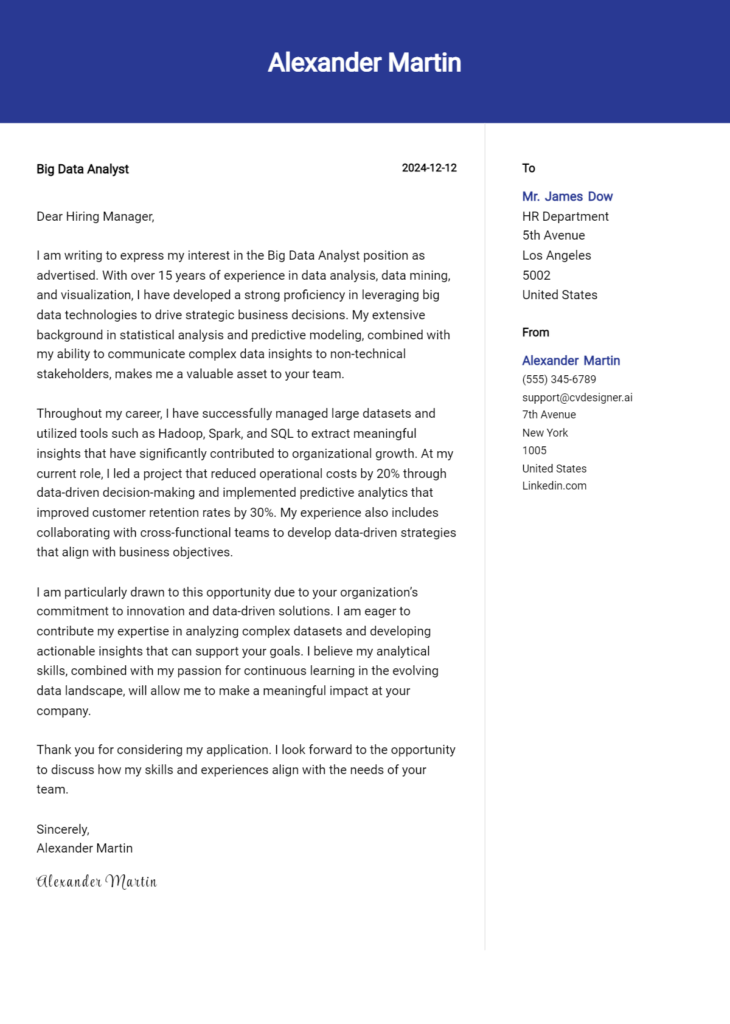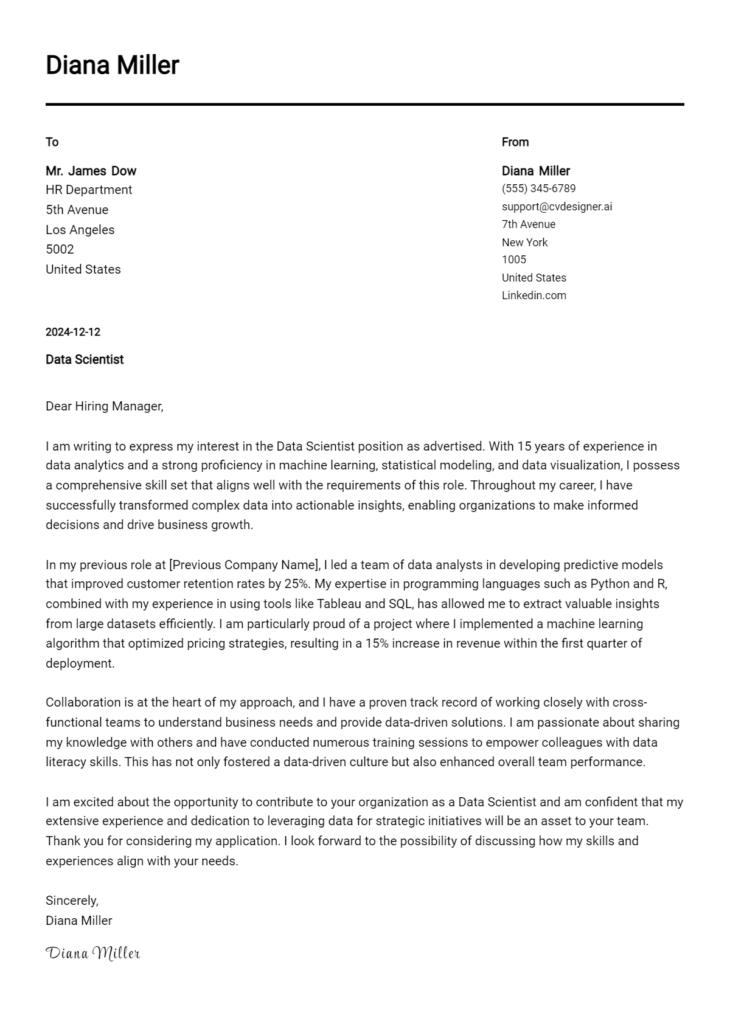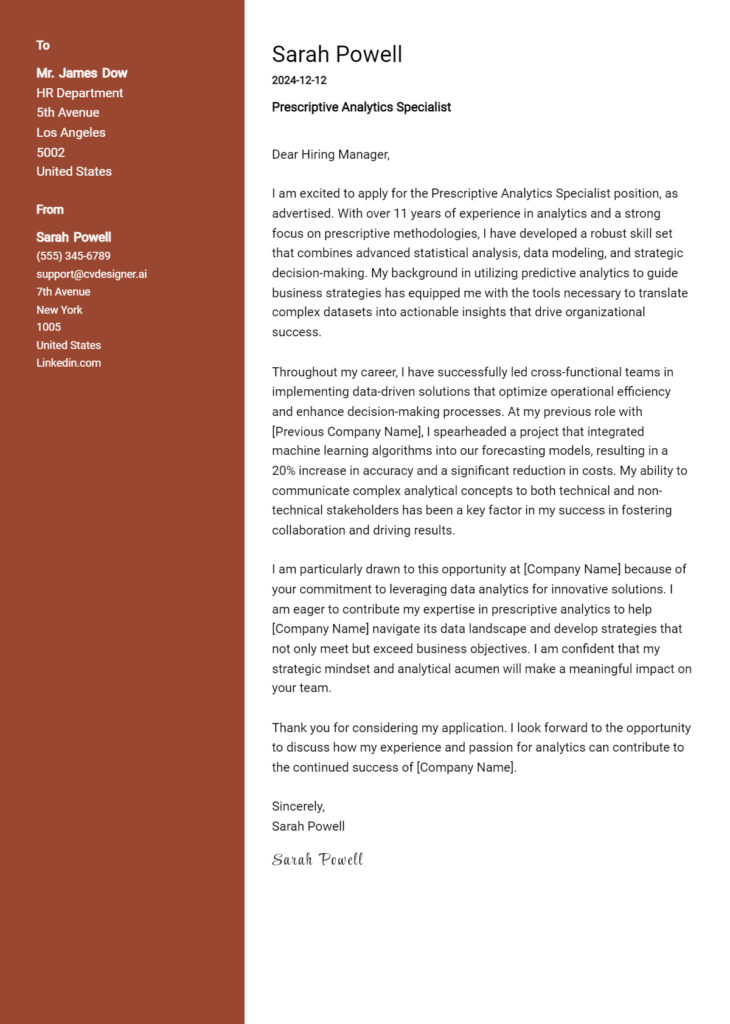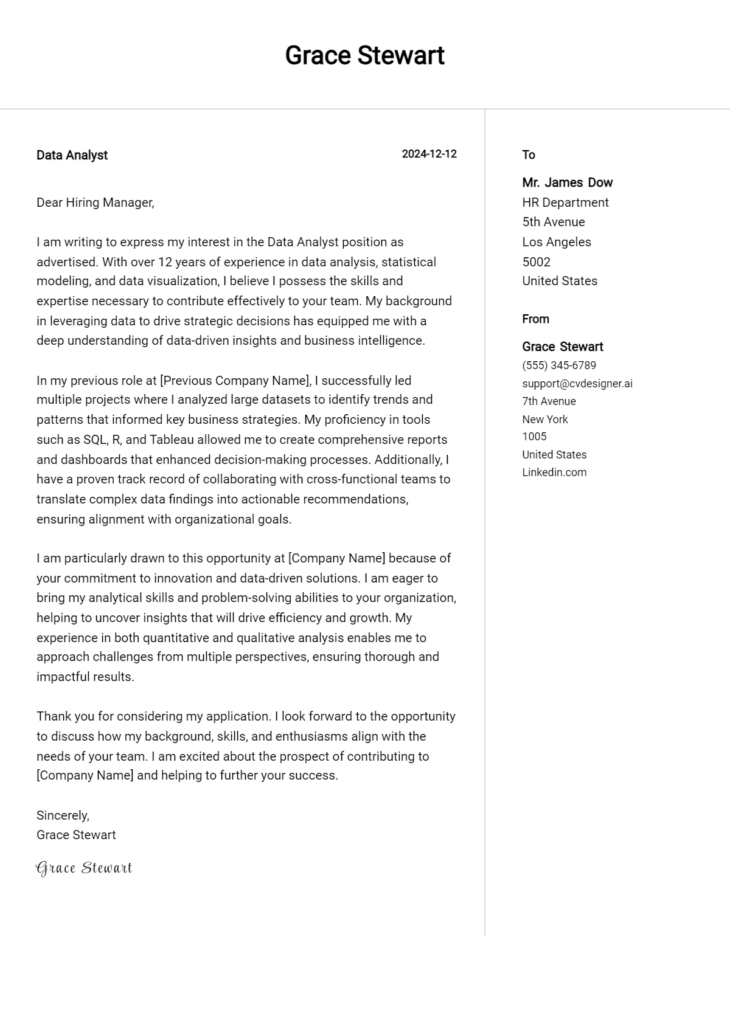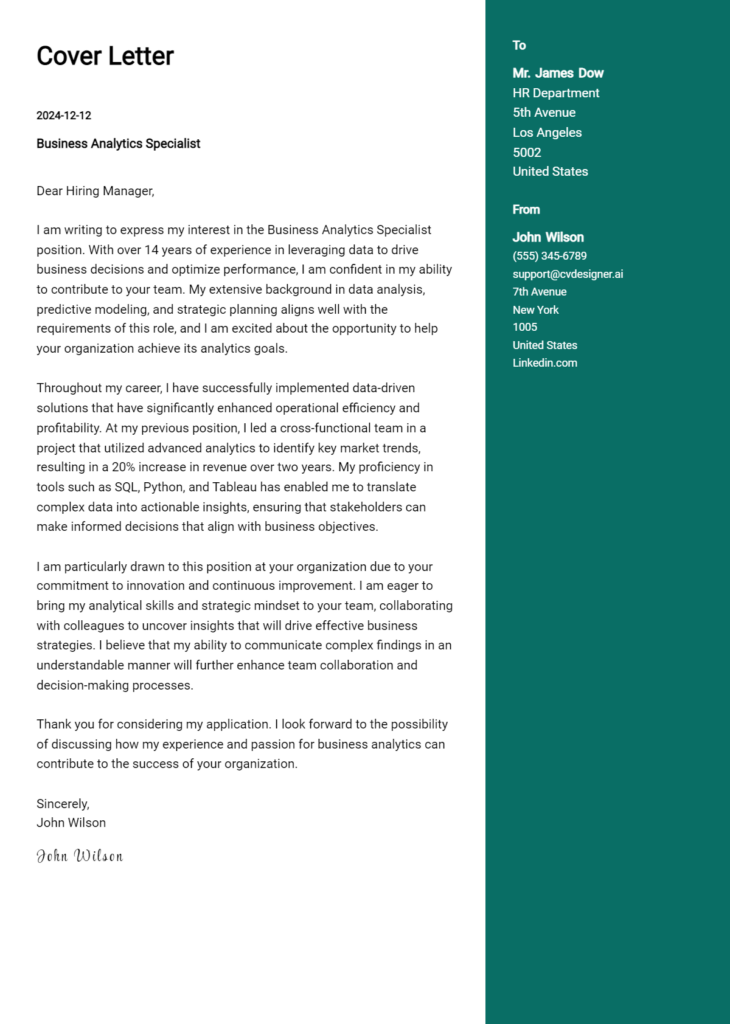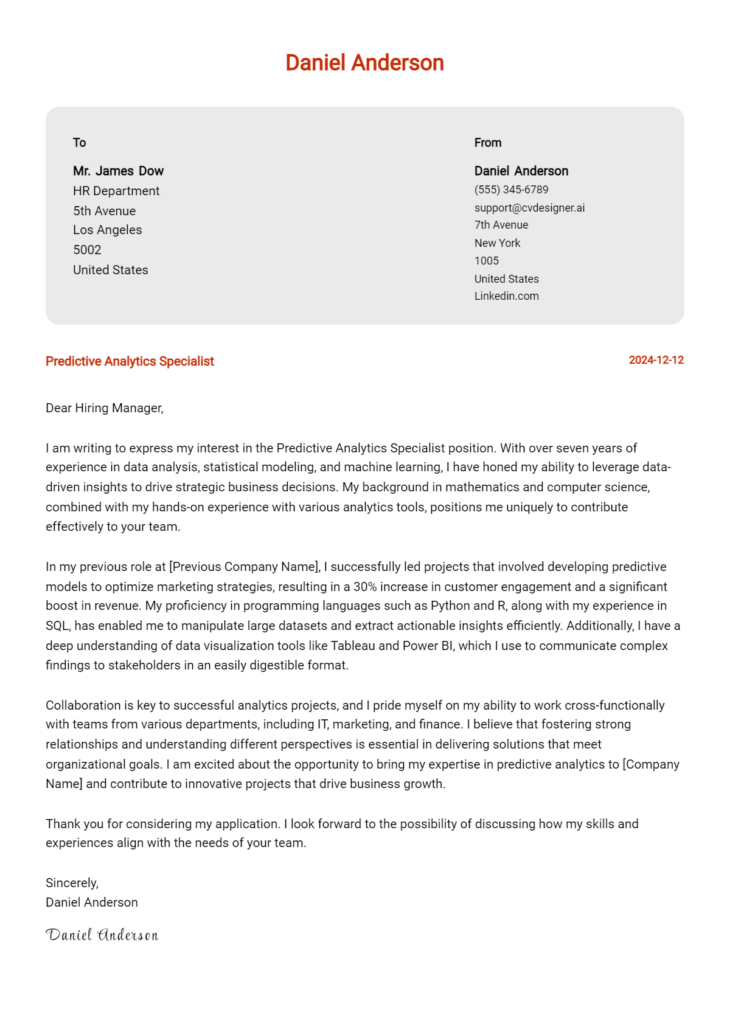Business Intelligence Analyst Cover Letter Examples
Explore additional Business Intelligence Analyst cover letter samples and guides and see what works for your level of experience or role.
How to Format a Business Intelligence Analyst Cover Letter?
Crafting a well-structured cover letter is essential for any Business Intelligence Analyst seeking to make a strong impression. In the field of data analysis, the ability to present information clearly and concisely is paramount. A meticulously formatted cover letter not only demonstrates your technical skills but also reflects your analytical mindset and attention to detail—qualities that are vital for success in business intelligence roles.
In this guide, we’ll walk you through the essential components of a professional cover letter, providing insights and examples tailored specifically for Business Intelligence Analysts.
We will focus on the key sections of a successful cover letter, including:
- Cover Letter Header
- Cover Letter Greeting
- Cover Letter Introduction
- Cover Letter Body
- Cover Letter Closing
Each section serves a critical purpose in showcasing your qualifications and professionalism. Let’s delve into each part to help you create a standout cover letter that resonates with potential employers.
Importance of the Cover Letter Header for a Business Intelligence Analyst
The cover letter header is a critical component of your application as a Business Intelligence Analyst, serving as the first impression to potential employers. It not only establishes your identity but also provides essential contact information to facilitate communication. A well-structured header conveys professionalism and clarity, which are vital traits in the field of business intelligence. The header should include your name, address, phone number, email, the date, and the recipient's details (including their name, title, company, and address). A clear and concise header sets the tone for the rest of your cover letter and signifies your attention to detail.
Strong Example:
Jane Doe 123 Business Lane Data City, DC 12345 (555) 123-4567 jane.doe@email.com October 1, 2023 Mr. John Smith Hiring Manager Data Solutions Inc. 456 Analytics Avenue Data City, DC 12345
Weak Example:
Jane D. 123 Lane 555-1234 hi@jane.com 10/1/23 To Whom It May Concern
The Importance of the Cover Letter Greeting
The cover letter greeting is a critical component that sets the tone for the entire communication. It serves as the first impression the hiring manager will have of you, showcasing your professionalism and attention to detail. By addressing the hiring manager directly, you personalize your letter and demonstrate a genuine interest in the position. Avoiding generic greetings, such as "Dear Hiring Manager," not only makes your application stand out but also reflects your commitment to researching the company and its personnel. If you're unable to find the hiring manager's name, consider using a department title or a more specific greeting that still conveys respect.
Strong Greeting Example
Dear Ms. Johnson,
Weak Greeting Example
To Whom It May Concern,
The Importance of a Well-Crafted Cover Letter Introduction for a Business Intelligence Analyst
A well-crafted cover letter introduction is crucial for a Business Intelligence Analyst as it sets the tone for the entire application. This opening paragraph should be engaging enough to capture the hiring manager's attention, clearly express the candidate's interest in the role, and briefly highlight key skills or achievements that make the candidate a strong fit for the position. A compelling introduction can make a significant difference in how the application is perceived, often determining whether the candidate progresses to the interview stage or not.
Strong Example
Dear [Hiring Manager's Name], I am excited to apply for the Business Intelligence Analyst position at [Company Name], as advertised on [Job Board/Company Website]. With over five years of experience in data analysis and visualization, I have successfully implemented innovative BI solutions that increased operational efficiency by 30% and improved decision-making processes across multiple departments. My passion for turning complex data into actionable insights aligns perfectly with your team’s mission to drive data-informed strategies.
Weak Example
Hi, I am writing to apply for the Business Intelligence Analyst job. I think I would be a good fit. I have worked with data before, and I can use Excel. I hope you consider my application.
Purpose of the Cover Letter Body for a Business Intelligence Analyst
The body of a cover letter for a Business Intelligence Analyst is crucial as it provides an opportunity for the candidate to highlight their relevant skills, experiences, and the unique value they can bring to the organization. It should effectively showcase specific projects or accomplishments that demonstrate the candidate's analytical abilities, technical proficiency, and problem-solving skills. By detailing past successes, such as improving data reporting processes or developing actionable insights that drove business decisions, the candidate can illustrate their impact and alignment with the company's goals. This section should be tailored to resonate with the hiring manager, reflecting both the candidate’s capabilities and their understanding of the organization's needs.
Strong Example
Dear [Hiring Manager's Name], I am excited to apply for the Business Intelligence Analyst position at [Company Name]. In my previous role at [Previous Company], I spearheaded a project that streamlined our data visualization processes, resulting in a 30% reduction in reporting time. By utilizing Tableau and collaborating closely with cross-functional teams, I was able to deliver actionable insights that led to a 15% increase in sales within one quarter. My experience in SQL and Python has equipped me with the technical skills necessary to manipulate large datasets and extract meaningful patterns. I am eager to leverage my expertise to help [Company Name] optimize its data strategies and drive informed business decisions. Best regards, [Your Name]
Weak Example
Dear [Hiring Manager's Name], I am writing to apply for the Business Intelligence Analyst job at [Company Name]. I have worked with data before, and I think I would be a good fit. I have a degree in Business and some experience with Excel. In my last job, I helped with reporting and some analysis. I believe I can do a good job at [Company Name] and help with data-related tasks. Sincerely, [Your Name]
Importance of the Cover Letter Closing for a Business Intelligence Analyst
The closing paragraph of a cover letter is a critical component, as it serves as the final opportunity to reinforce your qualifications, express enthusiasm for the position, and prompt the hiring manager to take the next steps. A strong closing summarizes key skills relevant to the Business Intelligence Analyst role, reiterates your interest in contributing to the organization, and encourages action, such as reviewing your resume or scheduling an interview. Conversely, a weak closing may lack clarity, fail to express genuine interest, or miss the chance to guide the reader towards the next steps.
Strong Example
Thank you for considering my application for the Business Intelligence Analyst position at [Company Name]. With my extensive experience in data analysis, proficiency in BI tools, and a proven track record of driving actionable insights, I am excited about the opportunity to contribute to your team. I am keen to discuss how my skills align with your needs and would welcome the chance to further elaborate on my qualifications in an interview. I look forward to your response and the possibility of working together to achieve [Company Name]'s goals.
Weak Example
I hope you like my resume. I think I would be a good fit for the job. Please let me know if you want to talk more about it. Thanks!
These tips will guide candidates in crafting an effective cover letter for a Business Intelligence Analyst position. A well-written cover letter can set you apart from other candidates by highlighting your technical skills, problem-solving abilities, knowledge of the software development life cycle (SDLC), teamwork experience, and a passion for continuous learning. By effectively showcasing these attributes, you can demonstrate your value to potential employers.
Tips for Crafting an Effective Cover Letter for Business Intelligence Analyst
Highlight Your Technical Skills
Begin your cover letter by showcasing your technical expertise. Specify the tools and technologies you are proficient in, such as SQL, Python, R, Tableau, or Power BI. Mention any relevant certifications or training you have completed, as this can enhance your credibility. Tailor your skills to match the job description and emphasize how they can contribute to the company’s goals.Demonstrate Problem-Solving Abilities
Business Intelligence Analysts are often faced with complex data challenges. Use specific examples from your experience to illustrate your problem-solving skills. Describe a situation where you identified a data issue and the steps you took to resolve it. Highlight any positive outcomes, such as improved decision-making or operational efficiency, that resulted from your analysis.Show Knowledge of SDLC
Your understanding of the Software Development Life Cycle (SDLC) is crucial for a Business Intelligence Analyst. In your cover letter, briefly explain your experience with SDLC methodologies, such as Agile or Waterfall. Discuss how you have applied these methodologies in past projects, focusing on your role in data collection, analysis, and reporting.Emphasize Teamwork Experience
Collaboration is key in Business Intelligence roles, as you will often work with cross-functional teams. Share examples of projects where you successfully collaborated with colleagues from different departments, such as IT, marketing, or finance. Highlight your communication skills and ability to translate complex data insights into actionable strategies for your team.Express a Passion for Continuous Learning
The field of business intelligence is constantly evolving, so demonstrating your commitment to continuous learning is essential. Mention any recent courses, webinars, or workshops you’ve attended to stay updated on industry trends and technologies. This shows potential employers that you are proactive in enhancing your skills, which is a valuable trait in a rapidly changing environment.
By applying these tips, you can create a compelling cover letter that effectively showcases your qualifications for a Business Intelligence Analyst position. For additional guidance, check out our cover letter templates or use our cover letter builder to streamline the writing process.
Common Mistakes to Avoid in a Business Intelligence Analyst Cover Letter
Crafting a compelling cover letter is essential for catching the attention of hiring managers in the competitive field of business intelligence. Avoiding common pitfalls can significantly enhance your chances of securing an interview. Here are some frequent mistakes and tips to steer clear of them:
Generic Greetings: Starting your letter with "To Whom It May Concern" can make it seem impersonal. Research the hiring manager's name and address your letter directly to them.
Repetitive Content: Simply restating your resume can bore the reader. Instead, use your cover letter to highlight specific experiences and skills that align with the job description.
Lack of Specificity: Failing to mention the specific company or role can make your letter seem generic. Tailor your content to reflect your interest in the specific position and organization.
Ignoring Formatting Guidelines: A cluttered or unprofessional format can distract from your message. Follow a clear cover letter format to ensure readability.
Neglecting Soft Skills: While technical skills are important, overlooking soft skills can be a mistake. Illustrate how your communication, teamwork, and problem-solving abilities contribute to your success as a Business Intelligence Analyst.
Overly Long Letters: Aim for clarity and brevity. A cover letter should be concise, ideally no more than one page.
Spelling and Grammar Errors: Typos can undermine your professionalism. Always proofread your letter or use tools to check for errors.
By avoiding these mistakes and focusing on what makes you a unique candidate, you can create a standout cover letter that complements your cover letter examples and showcases your qualifications effectively.
Cover Letter FAQs for Business Intelligence Analyst
What should I include in my cover letter for a Business Intelligence Analyst position?
In your cover letter, you should include a brief introduction that states the position you are applying for and how you found out about the job. Highlight your relevant experience, particularly in data analysis, database management, and any BI tools you are proficient in, such as Tableau or Power BI. Emphasize your problem-solving skills and ability to derive actionable insights from complex datasets. Additionally, mention any relevant educational background or certifications, such as a degree in data science or business analytics. Finally, express your enthusiasm for the role and the company, and conclude with a strong closing statement inviting the employer to review your resume.
How can I tailor my cover letter for a specific company?
To tailor your cover letter for a specific company, start by researching the organization’s mission, values, and recent projects or initiatives. Incorporate this information to demonstrate your understanding of the company’s goals and how your skills align with them. Use specific examples from your past experience that show how you can contribute to the company’s success, such as improving data-driven decision-making or optimizing data workflows. Additionally, mention any familiarity you have with the industry or sector the company operates in. Personalizing your cover letter not only showcases your genuine interest but also highlights your ability to align with the company’s objectives.
How long should my cover letter be?
Your cover letter should ideally be one page long, consisting of three to four paragraphs. Aim for a concise yet informative approach, typically ranging from 250 to 400 words. Start with a strong opening paragraph that captures attention, followed by a second paragraph detailing your relevant experience and skills. The third paragraph should emphasize your passion for the role and the organization, while the closing paragraph should invite further discussion. Brevity is key; ensure every sentence adds value and maintains a professional tone, as hiring managers often have limited time to review applications.
Should I include technical skills in my cover letter?
Absolutely! Including technical skills in your cover letter is crucial for a Business Intelligence Analyst position. Highlight your proficiency with data analysis tools, programming languages (like SQL or Python), and BI software (such as Tableau or Power BI). Use specific examples to illustrate how you have utilized these skills in your previous roles to solve problems or drive business outcomes. For instance, discuss a project where your analytical capabilities led to a significant improvement in reporting efficiency or data visualization. By showcasing your technical expertise, you demonstrate your readiness to contribute effectively to the team and the organization’s data-driven initiatives.
Build your Cover Letter in minutes
Use an AI-powered cover letter builder and have your letter done in 5 minutes. Just select your template and our software will guide you through the process.

